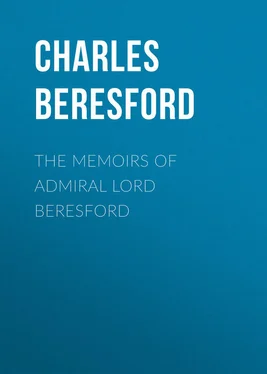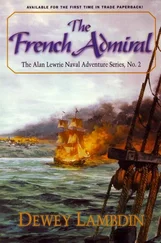Charles Beresford - The Memoirs of Admiral Lord Beresford
Здесь есть возможность читать онлайн «Charles Beresford - The Memoirs of Admiral Lord Beresford» — ознакомительный отрывок электронной книги совершенно бесплатно, а после прочтения отрывка купить полную версию. В некоторых случаях можно слушать аудио, скачать через торрент в формате fb2 и присутствует краткое содержание. Жанр: foreign_antique, foreign_prose, на английском языке. Описание произведения, (предисловие) а так же отзывы посетителей доступны на портале библиотеки ЛибКат.
- Название:The Memoirs of Admiral Lord Beresford
- Автор:
- Жанр:
- Год:неизвестен
- ISBN:нет данных
- Рейтинг книги:5 / 5. Голосов: 1
-
Избранное:Добавить в избранное
- Отзывы:
-
Ваша оценка:
- 100
- 1
- 2
- 3
- 4
- 5
The Memoirs of Admiral Lord Beresford: краткое содержание, описание и аннотация
Предлагаем к чтению аннотацию, описание, краткое содержание или предисловие (зависит от того, что написал сам автор книги «The Memoirs of Admiral Lord Beresford»). Если вы не нашли необходимую информацию о книге — напишите в комментариях, мы постараемся отыскать её.
The Memoirs of Admiral Lord Beresford — читать онлайн ознакомительный отрывок
Ниже представлен текст книги, разбитый по страницам. Система сохранения места последней прочитанной страницы, позволяет с удобством читать онлайн бесплатно книгу «The Memoirs of Admiral Lord Beresford», без необходимости каждый раз заново искать на чём Вы остановились. Поставьте закладку, и сможете в любой момент перейти на страницу, на которой закончили чтение.
Интервал:
Закладка:
"Madam, will ye have a care now of me Jewel, for glory be to God there's no saying what twist this mad one might give me!"
Entirely at ease, with the seat of his breeches patched with stuff of another colour from the rest, and his toes sticking from his stockings, he was wholly unperturbed by the laughter of the assemblage.
Although attired in cocked hat, frock coat, and epaulettes, I had the speed of him, and waited on him. Then the devil entered into me; and when Lord – drew abreast of a big plant of pampas grass, I cannoned into him, pitching him head first into the grass, not, of course, intending to harm him. But to my consternation and sorrow, Lord – 's leg was broken below the knee. I put the poor lord into his coach – he had a coach and four-in-hand – and drove him back to his hotel. That excellent and magnanimous sportsman was perfectly unconcerned.
"You hit me a bad skelp, and I am destroyed," said he. "Never mind, they all laughed, anny way."
It was about this period of my life, when, returning from a ball in London in the early morning, I came upon a person selling whelks. He invited me to sup – or breakfast – upon a plate of these delicacies.
"How much do you charge for a plateful?"
"Threepence," said he.
"I'll give you sixpence for every plateful you eat yourself."
"Done," said he.
He finished two platefuls, and had begun a third, when he was overtaken by rebellion from within, swiftly followed by catastrophe.
"That's not fair," I said. "You can't count those two platefuls."
"O my Gawd," he said. "'Ave I got to begin again?"
To this time, too, belong my memories of a certain famous naval captain, who was extraordinarily particular both as to his own dress and the wearing of proper uniform by others. His regard for appearances, however, did not prevent his diving overboard in full and immaculate uniform, including white gloves, to save a seaman. Exceedingly precise in his speech, he owned the singular trait of becoming deprived of utterance when he was angry; and few things made him more angry than faulty attire in the Service.
He was driving with me in a cab towards Plymouth, when we met an old warrant officer, who was wearing a purple woollen waistcoat and green gloves. My friend, stopping the cab so suddenly that the horse slithered along on its haunches, leaped from the vehicle. The old warrant officer, his attention arrested, had halted and turned round. My friend went up to him. Then I perceived that he was stricken speechless with wrath; for, continuing to swallow nothing, as his habit was in these crises of emotion, he tapped the warrant officer's waistcoat and gloves. Glaring at him and still silently swallowing, he turned about and got into the cab. The old warrant officer stood staring with dropped jaw, like a man petrified.
It was my friend who, being asked at a court-martial what he would have done in certain difficult circumstances, replied deliberately:
"If I was where I was not I might have done something I did not do."
In after years, when he was commander-in-chief at the Nore, he was walking along the road to Sheerness, dressed in plain clothes, when a bluejacket, who was slightly intoxicated, lurched against him.
"Man, man," said my friend, with his picked elocution, "do you know what you are doing? Man, you are colliding with the commander-in-chief."
"Ho," returned the seaman, totally unimpressed. "Har you, indeed? Then all I've got to say, is to say you've got a ruddy good billet – an' wha's more, you take care you don't lose it by getting drunk."
Despite of my diversions, I did a good deal of hard work. As flag-lieutenant I was in charge of the signalling, a science which, as it was understood in those days, I mastered completely.
My first independent command was the Goshawk gunboat, to which I was appointed as lieutenant-commander for the manoeuvres and for review in 1873, while I was still flag-lieutenant to Sir Harry Keppel. I had a narrow escape from disaster at the very beginning. Fortunately I noticed that the navigator was going the wrong side of the buoy off Drake's Island, and I was just in time to point out his mistake. I remember my feeling of horror at the prospect of running on a rock in Plymouth Sound in my first command.
The first thing I did in the Goshawk was to get from the flagship a big working party of a hundred men to work at holystoning our decks until they were as clean as a hound's tooth. From that day onwards I set myself steadily against bright-work and spit-and-polish. My objection to bright-work is that you have first to dirty it with brick and oil in order to clean it afterwards. There are certain things in a ship which must be kept bright, and these I would burnish; but everything that could be painted I would paint, and then scrub the paint with soap and water. I remember the shock it was to the commander when I told him to cover the brass rails with canvas and paint it. Under the spit-and-polish system no doubt the men take a pride in keeping the ship bright, but such a process involves perpetual extra bother and worry and black-list, which are quite unnecessary. Cleaning bright-work makes the men's hands filthy at divisions; and after ten minutes of bad weather, the copper turns blue and the brass green, and the whole of the work must be done over again.
At one time the bright-work system was carried to absurd extremes. I have known a ship actually to have a bright cable. I have known another ship with bright hammock hooks. The hatchways of some vessels were polished and decorated with inlay and all kinds of ocean ornament until the ship looked like a lady's boudoir or a transatlantic liner. The custom came in as the old sailing ships gave place to steam ships, when the time hitherto devoted to making a vessel all a-taunto, ropes taut, sail furling and mending and so forth, was given instead to polishing, burnishing and making bright-work shine, until the present system of gunnery and gymnastic training was introduced. Captains and officers used to spend on their ships large sums out of their private income, which very often they could ill afford. "Promotion by paint" was not unknown. A ship ought to be scrupulously clean, but she should have paint wherever possible, and soap and water should replace spit-and-polish.
CHAPTER XIV
POLITICAL EVENTS OF 1873-80 AND POSTSCRIPT
The following brief summary of political and international affairs is introduced for convenience of reference. It may be skipped by the reader, should he disdain politics.
The Government of Mr. Gladstone, returned to power in 1868, began to disintegrate in 1873. The proximate cause was the Irish University Education Bill, announced in the Speech from the Throne at the opening of the session on 6th February, 1873. Irish affairs have always been the curse of the Liberal Party. But a popular Government would have survived even the Irish University Education Bill, which, designed to please all parties, failed of course to please any. The truth is that, as people soon or late weary of all administrations, so they turned from the Liberal Government. Mr. Disraeli summarised the history of the Government in a piece of invective which has become classic: "You have had four years of it. You have despoiled churches. You have threatened every corporation and every endowment in the country. You have examined into everybody's affairs. You have criticised every profession and vexed every trade. No one is certain of his property, and no one knows what duties he may have to perform to-morrow. I believe that the people of this country have had enough of the policy of confiscation."
The Government were beaten on the Irish University Education Bill; Mr. Gladstone resigned; but Mr. Disraeli declined to take office. Mr. Gladstone was therefore compelled to carry on the Government. Early in 1874 he suddenly appealed to the electorate; which, however, chose to give his opponents a majority. Mr. Gladstone resigned, or partly resigned, his leadership, and plunged into the esoteric joys of a controversy dealing with the doctrine of Papal infallibility. It would seem that a great ecclesiastic was sacrificed, when the young Gladstone chose to give to politics talents which would have won him the Archbishopric of Canterbury.
Читать дальшеИнтервал:
Закладка:
Похожие книги на «The Memoirs of Admiral Lord Beresford»
Представляем Вашему вниманию похожие книги на «The Memoirs of Admiral Lord Beresford» списком для выбора. Мы отобрали схожую по названию и смыслу литературу в надежде предоставить читателям больше вариантов отыскать новые, интересные, ещё непрочитанные произведения.
Обсуждение, отзывы о книге «The Memoirs of Admiral Lord Beresford» и просто собственные мнения читателей. Оставьте ваши комментарии, напишите, что Вы думаете о произведении, его смысле или главных героях. Укажите что конкретно понравилось, а что нет, и почему Вы так считаете.












